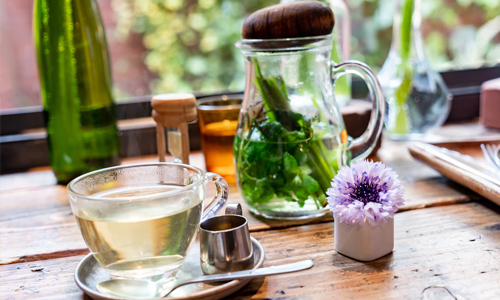Back

During the festive season, we have an ideal moment to reflect upon this most demanding time of year and ask ourselves whether there is a way of doing things differently? Do you ever find yourself in the first week of January feeling exhausted, overweight and in debt, and really wishing that you could have taken a holiday instead of all that shopping, cooking, eating and drinking?
So much of our health and wellbeing arises from our habits and lifestyles and, however conscious we are the rest of the year, Christmas can be the time that we default to our oldest family habits and national traditions. From November onwards the adverts pressure us relentlessly to buy turkey, ham, cheese, pickles, mince pies, plum puddings and brandy butter, chocolate and biscuits, all washed down with vast quantities of alcohol!
This is really the ultimate picture of what has happened to our Western diets, as most of us are now overfed and under-nourished. The more processed food we eat, the worse this gets as we are eating foods with the vital life-giving vitamins and minerals taken out. The less fruit and vegetables we have, the more constipation we have, and when combined with low levels of physical exercise this brings our digestive systems into a very sluggish state. Added to this is the problem of acid reflux that is common when we are overweight. As the fat content builds up within our abdomen around our intestines, this further impedes the transit of food through our systems and as our belly grows, there is upward pressure pushing our stomach up through our diaphragm causing heartburn due to acid reflux.
 The problem of acidity goes deeper than this, because the more acidic foods and drinks we consume, the more acidic our tissues become, creating the conditions for inflammation, infection and cancer to develop. The things that make us acidic are drinks such as tea, coffee, beer, wine, lager, champagne, tonic water, fruit juices, cordials, fizzy drinks and foods such as sour fruit, tomatoes, vinegar and pickles. The common myth that lemon and vinegar make us alkaline is just plain untrue. They actually cause a very strong buffering reaction as the body tries hard to neutralize the incoming acid, but this is at the expense of using up alkaline ions from our tissues. The net result is that whilst the body works to keep our blood constant at pH 7.4, our tissues get more and more acidic. Additionally, there are the many problems caused by excess sugar in the diet, which allows yeast to thrive and our gut contents to ferment, causing bloating, wind, inflammation, mental fog and leaky gut. Finally it lays the ground for bugs to develop, teeth to decay and the pancreas to fail, giving rise to Type 2 diabetes.
The problem of acidity goes deeper than this, because the more acidic foods and drinks we consume, the more acidic our tissues become, creating the conditions for inflammation, infection and cancer to develop. The things that make us acidic are drinks such as tea, coffee, beer, wine, lager, champagne, tonic water, fruit juices, cordials, fizzy drinks and foods such as sour fruit, tomatoes, vinegar and pickles. The common myth that lemon and vinegar make us alkaline is just plain untrue. They actually cause a very strong buffering reaction as the body tries hard to neutralize the incoming acid, but this is at the expense of using up alkaline ions from our tissues. The net result is that whilst the body works to keep our blood constant at pH 7.4, our tissues get more and more acidic. Additionally, there are the many problems caused by excess sugar in the diet, which allows yeast to thrive and our gut contents to ferment, causing bloating, wind, inflammation, mental fog and leaky gut. Finally it lays the ground for bugs to develop, teeth to decay and the pancreas to fail, giving rise to Type 2 diabetes.
Another big problem for our digestion is our sedentary lifestyle, as we sit all day at our computers, drive ourselves everywhere in our cars, and then sit or lie down to watch our TVs or work on our computers throughout the evening. The flow of our digestion is greatly assisted by movement, and if we remain still all the time, gut transit time slows down. We put on weight around our gut and, due to reduced blood flow around the body, little of the incoming nutrients get deeper into our tissues.
 We also need the extra oxygen that exercise gives us to make best use of our nutrition and to expel waste and carbon dioxide. Failure to exercise makes everything sluggish and we get more and more toxic. Additionally, as our calorie requirement drops in a sedentary lifestyle, we can find ourselves needing to eat less to avoid weight gain, and not taking in enough to provide our essential vitamins and minerals. This problem is called ‘the nutrition gap’ and is the reason why some good basic nutritional supplementation can be so important to maintain health and wellbeing when our food intake is low enough to stay slim.
We also need the extra oxygen that exercise gives us to make best use of our nutrition and to expel waste and carbon dioxide. Failure to exercise makes everything sluggish and we get more and more toxic. Additionally, as our calorie requirement drops in a sedentary lifestyle, we can find ourselves needing to eat less to avoid weight gain, and not taking in enough to provide our essential vitamins and minerals. This problem is called ‘the nutrition gap’ and is the reason why some good basic nutritional supplementation can be so important to maintain health and wellbeing when our food intake is low enough to stay slim.
Another huge factor for a healthy digestion is whether we can relax enough to digest and absorb our food. Eating slowly without rushing meals is essential. Savour every mouthful, appreciate flavours, and take time to think about the importance of the daily ritual of sharing a meal with your loved ones and what that means to you. Try using your opposite hand at the table, to slow you down and bring greater consciousness to the act of eating.
When trying to relax, it’s worth remembering that the housekeeping functions of the body only work if we switch out of the ‘fight and flight’ stress response across into the parasympathetic ‘let go’ state, which switches on the flow of our intestines and digestive juices. The same applies to any other sort of distress, so make sure that you have the emotional support you need to let go of your fears and worries.
The advice below goes for all times of the year but especially at Christmastime; think consciously about what you are taking in and what choices are really right for you.

Below you will find three useful digestive remedies from Weleda to help you through the festive period, or any time when your tummy's a little upset.

Digestive Health
Ten steps to improve your digestive health by Dr Rosy DanielDr Rosy Daniel, Weleda's Integrative Health Consultant, considers the impact of digestion on our health and wellbeing.
During the festive season, we have an ideal moment to reflect upon this most demanding time of year and ask ourselves whether there is a way of doing things differently? Do you ever find yourself in the first week of January feeling exhausted, overweight and in debt, and really wishing that you could have taken a holiday instead of all that shopping, cooking, eating and drinking?
So much of our health and wellbeing arises from our habits and lifestyles and, however conscious we are the rest of the year, Christmas can be the time that we default to our oldest family habits and national traditions. From November onwards the adverts pressure us relentlessly to buy turkey, ham, cheese, pickles, mince pies, plum puddings and brandy butter, chocolate and biscuits, all washed down with vast quantities of alcohol!
This is really the ultimate picture of what has happened to our Western diets, as most of us are now overfed and under-nourished. The more processed food we eat, the worse this gets as we are eating foods with the vital life-giving vitamins and minerals taken out. The less fruit and vegetables we have, the more constipation we have, and when combined with low levels of physical exercise this brings our digestive systems into a very sluggish state. Added to this is the problem of acid reflux that is common when we are overweight. As the fat content builds up within our abdomen around our intestines, this further impedes the transit of food through our systems and as our belly grows, there is upward pressure pushing our stomach up through our diaphragm causing heartburn due to acid reflux.
 The problem of acidity goes deeper than this, because the more acidic foods and drinks we consume, the more acidic our tissues become, creating the conditions for inflammation, infection and cancer to develop. The things that make us acidic are drinks such as tea, coffee, beer, wine, lager, champagne, tonic water, fruit juices, cordials, fizzy drinks and foods such as sour fruit, tomatoes, vinegar and pickles. The common myth that lemon and vinegar make us alkaline is just plain untrue. They actually cause a very strong buffering reaction as the body tries hard to neutralize the incoming acid, but this is at the expense of using up alkaline ions from our tissues. The net result is that whilst the body works to keep our blood constant at pH 7.4, our tissues get more and more acidic. Additionally, there are the many problems caused by excess sugar in the diet, which allows yeast to thrive and our gut contents to ferment, causing bloating, wind, inflammation, mental fog and leaky gut. Finally it lays the ground for bugs to develop, teeth to decay and the pancreas to fail, giving rise to Type 2 diabetes.
The problem of acidity goes deeper than this, because the more acidic foods and drinks we consume, the more acidic our tissues become, creating the conditions for inflammation, infection and cancer to develop. The things that make us acidic are drinks such as tea, coffee, beer, wine, lager, champagne, tonic water, fruit juices, cordials, fizzy drinks and foods such as sour fruit, tomatoes, vinegar and pickles. The common myth that lemon and vinegar make us alkaline is just plain untrue. They actually cause a very strong buffering reaction as the body tries hard to neutralize the incoming acid, but this is at the expense of using up alkaline ions from our tissues. The net result is that whilst the body works to keep our blood constant at pH 7.4, our tissues get more and more acidic. Additionally, there are the many problems caused by excess sugar in the diet, which allows yeast to thrive and our gut contents to ferment, causing bloating, wind, inflammation, mental fog and leaky gut. Finally it lays the ground for bugs to develop, teeth to decay and the pancreas to fail, giving rise to Type 2 diabetes.Another big problem for our digestion is our sedentary lifestyle, as we sit all day at our computers, drive ourselves everywhere in our cars, and then sit or lie down to watch our TVs or work on our computers throughout the evening. The flow of our digestion is greatly assisted by movement, and if we remain still all the time, gut transit time slows down. We put on weight around our gut and, due to reduced blood flow around the body, little of the incoming nutrients get deeper into our tissues.
 We also need the extra oxygen that exercise gives us to make best use of our nutrition and to expel waste and carbon dioxide. Failure to exercise makes everything sluggish and we get more and more toxic. Additionally, as our calorie requirement drops in a sedentary lifestyle, we can find ourselves needing to eat less to avoid weight gain, and not taking in enough to provide our essential vitamins and minerals. This problem is called ‘the nutrition gap’ and is the reason why some good basic nutritional supplementation can be so important to maintain health and wellbeing when our food intake is low enough to stay slim.
We also need the extra oxygen that exercise gives us to make best use of our nutrition and to expel waste and carbon dioxide. Failure to exercise makes everything sluggish and we get more and more toxic. Additionally, as our calorie requirement drops in a sedentary lifestyle, we can find ourselves needing to eat less to avoid weight gain, and not taking in enough to provide our essential vitamins and minerals. This problem is called ‘the nutrition gap’ and is the reason why some good basic nutritional supplementation can be so important to maintain health and wellbeing when our food intake is low enough to stay slim.Another huge factor for a healthy digestion is whether we can relax enough to digest and absorb our food. Eating slowly without rushing meals is essential. Savour every mouthful, appreciate flavours, and take time to think about the importance of the daily ritual of sharing a meal with your loved ones and what that means to you. Try using your opposite hand at the table, to slow you down and bring greater consciousness to the act of eating.
When trying to relax, it’s worth remembering that the housekeeping functions of the body only work if we switch out of the ‘fight and flight’ stress response across into the parasympathetic ‘let go’ state, which switches on the flow of our intestines and digestive juices. The same applies to any other sort of distress, so make sure that you have the emotional support you need to let go of your fears and worries.
The advice below goes for all times of the year but especially at Christmastime; think consciously about what you are taking in and what choices are really right for you.
Ten steps to improve your digestive health:
- Step 1 - Base your menus around the foods that are light and make you feel great. Christmas dinner could be roasted aubergines with chestnut stuffing or a beautiful poached wild salmon from Scotland.
- Step 2 - Stick to one main meal per day, eaten no later than 7pm so that you have time to digest your food before going to bed.

- Step 3 - Cut down the acid food and drink in your diet, swopping strong brown tea for Rooibos or Green Tea; swop fruit juice and fizzy drinks for neutral or alkaline water; tonic water for soda water. Alternate glasses of alcohol with glasses of water, and if you have a big drinking session take alkaline salts the following day to re-balance your system. Opt for mild fruits such as ripe melon, banana, blueberries, figs, dates and mango in place of sour fruits. Flavour your vinaigrettes with garlic, basil, cumin rather than lemon and vinegar and keep the pickles to a minimum.
- Step 4 - Take a minimum of 45 minutes of active exercise every day, ideally in the fresh air.
- Step 5 - Fast every few days, leaving out one or two meals to allow your body to digest excesses and eliminate any build-up of toxins.
- Step 6 - Spread out your Christmas goodies, instead of eating everything you like in three days, have something special in each of the weeks of December to avoid feeling overfed and bloated.
- Step 7 - Remember the natural remedies and therapies that can help to aid our digestion. Peppermint tea stimulates digestion and can help get things moving. Activated charcoal is a terrific old-fashioned remedy for getting rid of excessive wind. Psyllium husks are a great natural help for constipation along with senna.
- Step 8 - If you feel that your digestive system is out of balance, take a multi-strain probiotic for around six weeks.
- Step 9 – Avoid refined sugars and carbohydrates, and if you crave sugar, and bloat with gas, check for candida infection and if present, treat it with caprylic acid.
- Step 10 - During the festive season remember that you can show your love in many other ways than through food and gifts! Handwrite a letter, sing songs together, give a massage. And why not light up your house with twinkling tea lights on the darkest night of the Winter Solstice on December 21st or on Christmas Eve?
Below you will find three useful digestive remedies from Weleda to help you through the festive period, or any time when your tummy's a little upset.
Digestion Calming Drops
If you’ve rather overindulged, Digestion Calming Drops will help tackle nausea and stomach upsets, including gripey tummy ache that you might get from too much rich food and drink. The subtly citrus and spicy aroma comes from natural plant extracts or distillates such as Lemon Balm, which is traditionally used for its calming properties.
Always read the label
If you’ve rather overindulged, Digestion Calming Drops will help tackle nausea and stomach upsets, including gripey tummy ache that you might get from too much rich food and drink. The subtly citrus and spicy aroma comes from natural plant extracts or distillates such as Lemon Balm, which is traditionally used for its calming properties.
Always read the label
Digestive Relief Oral Spray
A homeopathic medicine for the symptomatic relief of indigestion and bloating. The spray contains 6X potencies of the homeopathic remedies Carbo Veg and Colocynth, prepared by hand at Weleda using traditional methods. A handy remedy to ease the discomfort of indigestion and gas that could potentially spoil a celebration.
Always read the label
A homeopathic medicine for the symptomatic relief of indigestion and bloating. The spray contains 6X potencies of the homeopathic remedies Carbo Veg and Colocynth, prepared by hand at Weleda using traditional methods. A handy remedy to ease the discomfort of indigestion and gas that could potentially spoil a celebration.
Always read the label
Fragaria/Vitis 80 Tablets
A useful natural remedy for the symptomatic relief of bilious symptoms and nervous indigestion, made from extracts of wild strawberry leaf and grapevine leaf. Ideal if you’re feeling (or worried you might feel) a bit queasy after lots of rich festive fare.
Always read the label
A useful natural remedy for the symptomatic relief of bilious symptoms and nervous indigestion, made from extracts of wild strawberry leaf and grapevine leaf. Ideal if you’re feeling (or worried you might feel) a bit queasy after lots of rich festive fare.
Always read the label
Shop Weleda self-care products:
Digestion Calming Drops 25ml
Item No.
206015
£11.50
Add to basket
Digestive Relief Oromucosal Spray 20ml
Item No.
303004
£13.25
Add to basket
Fragaria/Vitis 80 Tablets
Item No.
207017
£12.25
Add to basket







